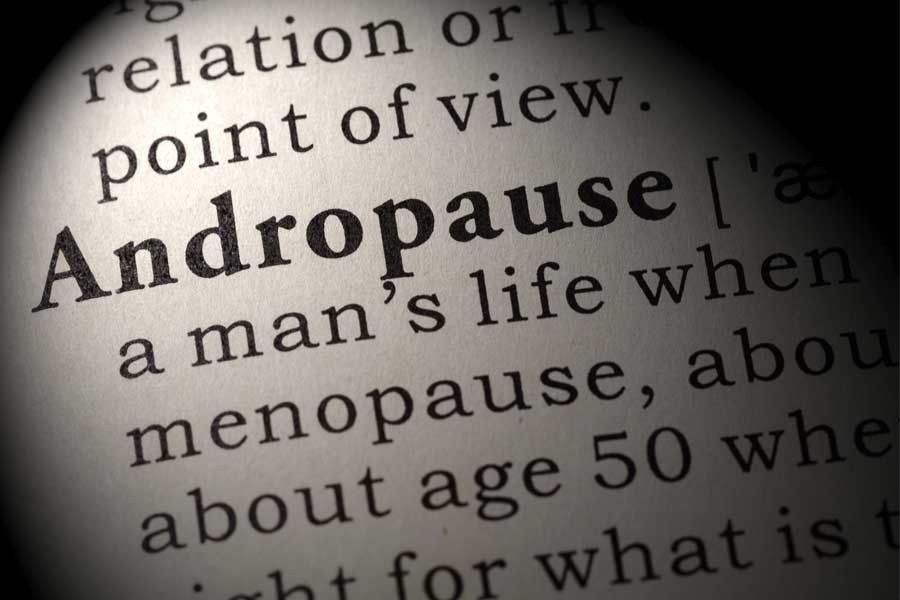Trusted for 25+ Years
Andropause: Natural Treatments

Dr. Lisa Lawless, CEO of Holistic Wisdom
Clinical Psychotherapist: Relationship & Sexual Health Expert

Menopause and Andropause
Andropause is the male equivalent of menopause when testosterone drops significantly. Testosterone levels for men begin to drop during their thirties at a rate of 1% per year. Andropause is the point during their fifties that testosterone levels drop enough to affect health, mood, and sex drive. This article will review approaches to keeping sex hormones balanced.
Factors Of Male Menopause
- Low testosterone
- Onset of illness: diabetes, heart disease, colon and prostate cancer
- Diminished sex drive
- Muscle loss
- Depression
Low Testosterone
Testosterone is a hormone all people have, and while it is more often associated with men, it affects sexual function in men and women. In addition to sexual function, it also influences one's metabolism, body composition (fat vs. muscle mass), and mineral bone density.
As men age, there is a natural decline in testosterone production, which occurs gradually, typically starting around thirty. When testosterone levels dip too low, health issues are associated with that drop, such as insulin resistance, which can lead to type 2 diabetes, obesity, inflammation in the body, increased cholesterol and triglycerides, and increased risks for cardiovascular disease.
Risks of Testosterone Treatments
While testosterone treatment may improve sexual functioning, body mass index, exercise performance, and enhance LDL cholesterol and blood pressure, there is also a correlation of increased cardiovascular risks. Because there have been positive benefits from testosterone treatment, many men are being prescribed it by their doctors; however, the problem is that in some cases, it is being done without valid evidence of a man having low testosterone.
The high rate of heart attacks and strokes from testosterone therapy has made clinical trials challenging as they put men's health in too much danger. However, a study was done in 2013 that examined older men with low testosterone found that there was a greater risk of all-cause mortality, heart attack, and stroke when using testosterone treatment. Another trial showed a 54 percent increased risk of cardiovascular events.
It is essential to understand that testosterone needs to be at the ideal level as health issues can be caused by having too much or too little, and taking testosterone should only be done by those men who need it as the health risks are high in doing it.
Natural Alternatives
It is essential to understand that testosterone levels do not drop just due to aging; they can decrease with a poor diet and higher fat levels in the body. It becomes a vicious cycle in which high body fat promotes lower testosterone, which encourages more body fat, which can then lead to diabetes and cardiovascular disease. This means that keeping a healthy weight is key to healthy testosterone levels.
In addition, it is undoubtedly a good idea to avoid endocrine-disrupting chemicals, such as those found in plastics, some pesticide residues, and pollutants in fish and other animal foods, as they may undoubtedly contribute to low levels of testosterone as well as other hormone imbalances.
Another contributor to low testosterone levels may be cholesterol-lowering statin drugs (such as Lipitor or Zocor), according to a 2010 study that evaluated nearly 3,500 men who had erectile dysfunction (ED). The CDC now estimates that one in six adults in the U.S. has high cholesterol. With such an increase and the powerful efforts of big pharma, the number of people taking statins rose 88% from 2000 to 2005, with people rising from 15.8 million people to 29.7 million. While low testosterone levels and high cholesterol levels share some common causes, there is a link to stain use and lowered testosterone.
Statins are often used as a band-aid for heart disease when in reality, a healthy diet and exercise will treat the underlying cause and help regulate hormones such as testosterone. Current research shows that men can increase testosterone naturally by simply eating healthy, maintaining a healthy weight, and adequate vitamin D3 and zinc supplementation.
The best resources we can recommend for nutritional advice are Joel Fuhrman, M.D., which provides scientifically proven methods to address high cholesterol and low testosterone. He has several books, but great ones to start with are either Eat to Live or Super Immunity. For a helpful guide, please see our Nutrition Guide for Good Sex & Health.


